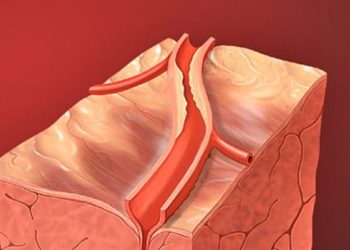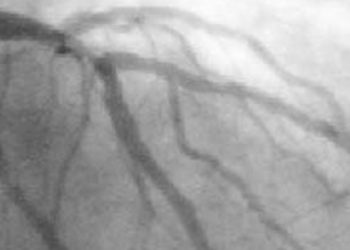The APPROACH trial: volanesorsen lowers triglyceride levels in patients with familial chylomicronemia
1. Triglyceride levels in familial chylomicronemia patients were notably reduced when treated with the apolipoprotein C-III antisense mediated inhibitor volanesorsen compared to placebo treated patients.
2. Patients treated with volanesorsen experienced thrombocytopenia and injection site reactions, and a notable number of volanesorsen patients discontinued the trial due to treatment related adverse events.
Evidence Rating Level: 1 (Excellent)
Study Rundown: Reduced or absent lipoprotein lipase (LPL) activity is characteristic of familial chylomicronemia syndrome. LPL breaks down serum triglycerides, and its dysfunction results in markedly elevated triglyceride levels that clinically results in a multitude of symptoms including abdominal pain and recurrent pancreatitis. Volanesorsen is an antisense therapeutic that reduces apolipoprotein C-III (APOC3) mRNA, as APOC3 is a risk factor for hypertriglyceridemia. In this phase 3 randomized controlled trial patients randomized to receive volanesorsan for 3 months had a marked reduction in triglyceride levels compared to placebo treated patients. Patients in the treatment group experienced injection site reactions and thrombocytopenia as adverse events.
This randomized trial shows clinical biomarker promise of a potential first-in-class therapy for familial chylomicronemia. Longer term follow-up and confirmation that treatment reduces disease complications such as pancreatitis will provide clinical substantiation for the utility of this treatment.
Click to read the study, published today in NEJM
Relevant Reading: Statins for children with familial hypercholesterolemia
In-Depth [randomized controlled trial]: This phase 3, double-blind, randomized, controlled trial enrolled patients between 2014 and 2016. Eligible patients were adults with genetically or clinically confirmed familial chylomicronemia syndrome. After a 6-week run-in period to stabilize patient diets, patients with triglyceride levels of 750 mg/dl or higher were randomized to a volanesorsen (n=33) or placebo (n=33) group. A single subcutaneous injection was given weekly for 52 weeks, with 300mg volanesorsen administered in the treatment group. The primary endpoint of percent change in fasting triglyceride levels from baseline to the end of month 3 showed a 77% decrease and 18% increase in mean triglyceride levels for patients in the treatment and placebo groups, respectively. This corresponded to a mean decrease of 1712 mg/dl (95% confidence interval [CI], 1330 to 2094 mg/dl) and increase of 92.0 mg per deciliter (95% CI, −301.0 to 486 mg/dl) in the treatment and placebo groups, respectively (P<0.001). A triglyceride level of less than 750 mg/dl at 3 months was achieved in 77% vs. 10% of treatment and placebo patients, respectively. Injection site reactions occurred in 20/33 (61%) of treatment patients. Thrombocytopenia occurred in 11/33 (33%) of treatment patients, with both adverse events occurring more than in placebo treated patients. Of the volanesorsen treated patients, 9 withdrew from the trial due to adverse events.
Image: PD
©2019 2 Minute Medicine, Inc. All rights reserved. No works may be reproduced without expressed written consent from 2 Minute Medicine, Inc. Inquire about licensing here. No article should be construed as medical advice and is not intended as such by the authors or by 2 Minute Medicine, Inc









